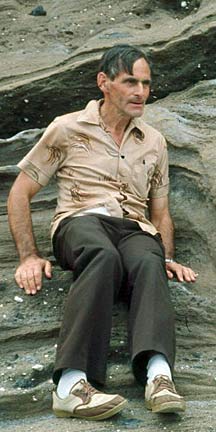GEORGE P.L. WALKER / 1926-2005
UH scientist pioneered
volcano studies
George P.L. Walker, former University of Hawaii professor and world-renowned volcanologist whose research led to an understanding of how basaltic volcanoes grow, died Jan. 17 in England. He was 78.
![]()

![]()
George P.L. Walker: The retired professor was widely deemed the "father of volcanology"
The pioneering volcanologist was the first to hold the Gordon A. Macdonald Chair in Volcanology -- established in 1979 in the UH Department of Geology and Geophysics -- to attract the world's best volcanologists for research and teaching and act as the state volcanologist.
Walker was outstanding in all areas, according to colleagues and former students.
Steve Sparks, professor of geology at the University of Bristol, where Walker held an honorary position, wrote an obituary for his former professor saying: "George was a quiet man, who never sought the limelight. He was at his happiest in the field in remote parts of the world making observations that changed our understanding of volcanoes forever. ... His contributions to science were seminal and broad-reaching."
John Sinton, UH geology and geophysics professor, said Walker "was an extremely effective and popular instructor" who loved to take students into the field and show them geologic relationships. "He was a stimulating man."
Zinzuni Jurado-Chichay, postdoctoral UH geology and geophysics researcher, said she was Walker's "very last student." He retired from UH in 1996, but she had not finished her doctoral work so he continued as her adviser, she said.
She said he was a great teacher: "He was always thinking about how things got there instead of they're just there. He made you think on your own." Walker was born in London and grew up there and in Northern Ireland. He returned to Gloucester after retirement from UH but continued his research.
Steve Self, another former student, now at the Open University in Milton Keynes, England, recently visited him and told Rowland he still had his sense of humor and "twinkle in the eye" despite illness.
Besides extensive research on Big Island volcanoes, Walker had studied Oahu's Koolau volcano. He was interested in pictures Rowland sent to him of new dike exposures along the Pali Highway, Self said.
Walker became fascinated as a youth with the geology and minerals in basalt lavas of Antrim, Ireland. He pursued studies at the Queen's University of Belfast and Leeds University, earning a doctorate degree in mineralogy.
He taught mineralogy, geology and volcanology at the Imperial College in London from 1951 to 1978. During that time he did extensive research on old lava flows in Iceland and volcanoes in Italy.
He started a 10-year project in 1954 studying volcanic processes and mapping lavas and zeolite mineral zones in Iceland. His work revolutionized understanding of Iceland's geology, Sparks said.
He was one of few foreigners to receive the Icelandic Order of the Falcon, the equivalent of a knighthood, conferred by the president of Iceland in 1977.
In 1978 he accepted a Captain James Cook Research Fellowship from the Royal Society of New Zealand and studied young explosive volcanism of the North Island.
In the 1960s and 1970s, Walker focused on the geology and eruptions of young active volcanoes -- advancing understanding of the structure of volcanoes and "establishing new ways to assess volcanic hazards," Sparks said.
Walker published a large volume of papers on many geologic topics. He shared his excitement about geology and volcanoes with UH students and thousands of others in talks to schools and community groups.
He received many awards, including the highest given in volcanology, the Thorarinsson medal from the International Association of Volcanology and Chemistry of the Earth's Interior; the Wollaston Medal, the most prestigious award given by the Geological Society of London; the UH Board of Regents Award for Excellence in Research; and the Lyell Medal of the Geological Society of London.
Survivors include wife Hazel, daughter Alison and son Leonard, all in England, and grandson Matthew of Honolulu.
[News] [Business] [Features] [Sports] [Editorial] [Do It Electric!]
[Classified Ads] [Search] [Subscribe] [Info] [Letter to Editor]
[Feedback]
